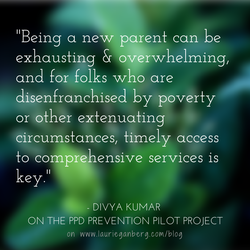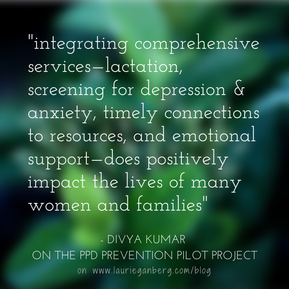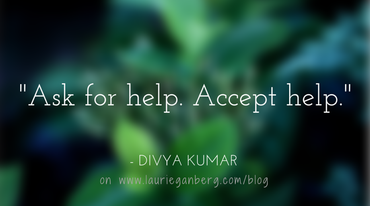 Senator Lovely speaking about her involvement with the PPD Commission. Senator Lovely speaking about her involvement with the PPD Commission.
I went to the screening of the maternal mental health documentary, Dark Side of the Full Moon, last night, organized by Leslie McKeough, LICSW - a Lynnfield therapist - and the North Shore Postpartum Depression Task Force. The documentary highlights the experiences of several women who experienced perinatal mood and anxiety disorders, the dismal state of screening for emotional complications in pregnancy and postpartum, and the barriers to treatment for these women. Interspersed are the news stories of the lives lost to maternal mental illness while they were filming the documentary.
Women feel guilty, self-conscious, isolated, and overwhelmed when they're experiencing emotional complications in the postpartum. Supporting women with perinatal emotional complications is about more than a 10-item questionnaire, though that's a good first step. It's about more than having a therapist's phone number, though that's needed too, and hopefully many people have that therapist's number or know where to look. It's knowing that if they reveal to you how they feel, they're doing so with fear and worry about not being a good mother, about their baby being "taken away," about never feeling like themselves again.
Supporting women with perinatal emotional complications is about having effective systems of care in the community that would include
These issues, this stigma, these barriers to care are why I and three colleagues founded the Every Mother Project with the belief that every mother deserves comprehensive perinatal support. We developed a Perinatal Toolkit for women's health professionals to better understand, recognize, know how to talk about, and support women through perinatal emotional complications. We've had lactation counselors, doulas, pelvic floor physical therapists, midwives, acupuncturists and many other birth and postpartum professionals download the toolkit. Our hope is that with more training and awareness for all the myriad of people who come into contact - and often develop quite close and important relationships - with pregnant and postpartum women and new parents, more women will feel heard and understood and will be able to be connected to the right supports. The movie didn't get into the racial and socioeconomic disparities that exist in maternal mental health, but I'd be remiss in not mentioning them here. There's been yet another study that examined stress in pregnancy and risk of postpartum depression, finding that more stress events (financial, partner, trauma, or emotional) in a woman's life was directly correlated with a higher risk for emotion complications. Other studies have identified that experiences of racial discrimination during pregnancy (which can be prevalent within medical systems) not only affect the pregnant woman's own emotional and physical health, but also impact the infant's stress physiology response. So yes, institutional racism and systemic oppression have real effects on pregnant and postpartum women of color and women in poverty, increasing their risk for perinatal emotional complications, all while making it harder for them to be identified and access treatment.
I'm so thankful for the chance to view Dark Side of the Full Moon, and that so many others did, too. We have much to do still to better support women through perinatal emotional complications - even in Massachusetts. Please, at least take a look at the trailer if you missed it. And maybe we can organize another viewing...
 My dear friend and colleague, Divya Kumar, does amazing work. She's certified as a postpartum doula and lactation counselor, runs groups for new moms, and uses her public health background to develop and advocate for effective programs that actually improve access to comprehensive support for pregnant and postpartum women. All in the name of not just treating postpartum depression, but fostering emotional wellness. Here's my interview with her about the pilot program that was funded* by the state of Massachusetts to integrate postpartum support into existing medical systems. Tell me how the pilot program came about. DK: I was transitioning back to working outside the home after my second child was born and I started working as a postpartum doula. I have a public health background, and I tend to think in terms of systems and programs. I think about who has access to what services--and how and why. Every new mom can benefit from a postpartum doula, but not every mom knows what one is or can afford one, so I started thinking about how to increase access to postpartum doula services for all moms, and I thought it would be fantastic to have a postpartum doula in every pediatrician's office so that new moms could get emotional support, ask questions about things like sleep and soothing, and get help with breastfeeding. When my first child was a newborn, I had met Jessie Colbert at a local new moms' group. She is the administrative aide for Rep. Ellen Story, who chairs the Postpartum Depression Commission. So later, when I came up with the idea of integrating postpartum support into pediatric health settings, Jessie suggested that we develop this program as a postpartum depression prevention initiative. Rep. Story pushed for funding and the pilot program received $200,000 in 2013 to be split across four community health centers that serve a diverse patient population, including folks who are disenfranchised and under-served. What exactly does the pilot program look like? DK: The pilot looks a little different at the different community health centers, meaning that the centers have incorporated and built upon different aspects of perinatal care based on the capabilities of their own sites and the needs of their patients. In Lynn, mental health providers do home visits for new moms experiencing perinatal emotional complications. In Worcester, a team of OB advocates work with moms from pregnancy through the first two years of their child's life. In Jamaica Plain, we provide lactation support in our pediatric service, regardless of whether a baby's mom is a patient at the health center. What makes this different than other efforts to address postpartum depression?  DK: One of the big differences is that the pilot program integrates perinatal support into existing medical systems, and this integration reduces barriers and increases timely access to care for folks who need it. Being a new parent can be exhausting and overwhelming, and for folks who are disenfranchised by poverty or other extenuating circumstances, timely access to comprehensive services is key. At Southern JP Health Center (where I work), we see all new babies at their first pediatric visit--as early as 3 days postpartum! I come into the exam room after a physician sees a baby and screen the new mom for postpartum depression with the EPDS [Edinburgh Postnatal Depression Scale]. Also, providing comprehensive services means that we approach the mom and baby as a dyad. So, if a mom is struggling with perinatal emotional complications, I can connect her with a mental health provider in-house or in the community, and I can also help with issues within the dyad (breastfeeding and lack of sleep are the usual culprits here!) that can be exacerbating these complications. What difference do you see yourself and the program having in people’s lives? DK: I have had many moms tell me that they would have given up on breastfeeding if I hadn't walked into that exam room! It is such an honor to be in a position to help someone in that moment of distress. I have also walked patients who were having a mental or emotional health crisis up to our mental health department, where they were seen within the hour. Without screening them at their child's appointment, there's no way to know whether that crisis would have been identified and if they would have received mental health support. Also, I have had numerous moms contact me months after their babies were born to ask questions, get referrals, or just additional support, and many of these moms say to me, "It's so helpful to know that you're here to help me figure all of this out!" Having someone that they know they can contact with questions or concerns (especially those that are not directly related to their baby's health) is very reassuring for moms. What do you see happening next for the pilot program?
What’s one thing you would tell all mothers of newborns? DK: You're not supposed to do this by yourself! New moms are really isolated these days--many of us don't live with our parents or siblings, or in a home where friends and relative are constantly coming and going. I have heard many moms say, "I feel like I'm supposed to be able to do this by myself, but it's really hard!" Taking care of a newborn, figuring out breastfeeding, and adjusting to life as a parent involves a HUGE learning curve...while being utterly exhausted and recovering from the actual birth. Doing it yourself is often a very, very difficult task, and not one that new moms should have to take on. Ask for help. Accept help. Call a lactation professional. Call a friend. Go to a moms' group. Parenthood is better when we do it together! And, if I could tell expectant parents one thing, it would be to make a postpartum plan and get to know their local resources *before* their baby arrives. Make a list of lactation professionals, postpartum doulas, new parents' groups, meal delivery options, etc. I want to thank Divya Kumar for answering these questions and most importantly for all her work supporting new moms and advocating for better systems to care for new families. Have any questions for Divya? Continue the conversation in the comments! *In 2014, the funding for this pilot program was cut out of the budget. Rep. Story has again introduced a line item to fund the 4 locations of the pilot program in the new budget. Please consider calling your legislator to ask them to support budget line item 4510-0112. |
Therapy, Groups, Supervision, Consultation, Training in Seattle, WA and online in Washington state
Laurie Ganberg, LICSW, PMH-C (#LW60673320) ~ Specializing in Perinatal Mental Health, Trauma, & Fat Liberation
Now practicing through Fiddlehead Therapy, PLLC with online services and in person in Mountlake Terrace, WA
Home | Privacy | Contact | Zoom Link
© 2019-2024 All rights reserved
Laurie Ganberg, LICSW, PMH-C (#LW60673320) ~ Specializing in Perinatal Mental Health, Trauma, & Fat Liberation
Now practicing through Fiddlehead Therapy, PLLC with online services and in person in Mountlake Terrace, WA
Home | Privacy | Contact | Zoom Link
© 2019-2024 All rights reserved


